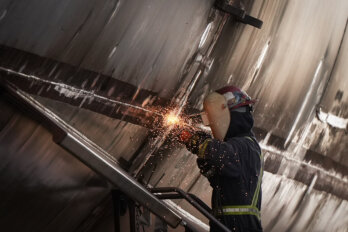Doug Ford might be the luckiest politician alive. One must wonder, at some point, where he’s keeping all the horseshoes.
When he called an unnecessary $189 million election in late January, there were warnings he could face the same fate as former Liberal premier David Peterson, who went to the polls early and lost his government and his seat in 1990. As Donald Trump’s February 1 tariff threat edged closer—raising fears that the shock to Ontario’s auto and agri-food sectors could drag the province, and Canada, into recession—Ford’s risky bet looked more like a masterstroke.
Threatening to shut off power to homes in New York, Michigan, and Minnesota, Ford pressed the rest of Canada to return fire at scale. He even donned a hat that read “Canada is not for sale.” It was embarrassing, aping Trump’s style and strategy, but people ate it up, and there was something to it. Ford was standing up for the federation, pleading the province and country’s case. It was almost reassuring.
For more discerning readers of the news, the irony isn’t lost that Ford’s election call makes it harder for him and his government to deal with Trump and his tariff threat. Billing themselves as sound economic managers, a steady hand for an unsteady time, the Progressive Conservatives promised to invest billions into Ontario businesses affected by any disruptions. Great news, but it would have been better had there been no election—in which case Ford could have passed the package through the legislature with his majority. Indeed, he could have focused all of his time on managing the crisis rather than campaigning on it.
But campaigning on it he is, along with anything else that can conceivably be cast as a salvo in the struggle against Trump. The first days of Ford’s response were a study in doing the correct and expedient thing, of meeting the moment and making it work for you too. He hit the US airwaves, saying, “I just can’t roll over.” In a press conference, he emphasized retaliation was necessary: “Canada didn’t start this fight with the US, but you better believe we’re ready to win it.” He pulled American liquor from the shelves of the Liquor Control Board of Ontario, one of the world’s largest alcohol purchasers. Ford’s bet was that as Kentucky bourbon dried up in the province, he would rise in the polls.
Calling Elon Musk “part of the Trump team that wants to destroy families, incomes, destroy businesses,” the premier promised to tear up a $100 million contract with the tech mogul’s Starlink, a satellite system meant to deliver high-speed internet to the province’s rural, remote, and northern communities. It was a winningly dramatic move, though the deal should never have been signed in the first place; opposition leaders have been calling for him to scrap it, arguing that Ontario-based providers should have been prioritized. Ford also planned to ban US vendors from Ontario contracts—which he claims will cost stateside businesses tens of billions of dollars.
With the tariffs now on hold for thirty days, Canada, including Ontario, is at a kind of economic détente with the US—with Ford pausing his own retaliatory measures. The thing about wartime, both literal and figurative, is that it can blunt the sharper edges of critical political reflection. And there’s a lot to reflect on: Ontario’s opposition parties have their own plans to deal with tariffs; Ford has a long history of making terrible deals; he spent years as an “unwavering” Trump supporter; and his government is under police investigation for its Greenbelt land giveaway.
For now, all of this has been relegated to the back pages as the province rallies against an external threat and the Ontario election becomes about standing up to Trump, a job Ford has expertly sold himself for, as if he’d come straight out of central casting. Ford’s hot-mic moment last week—when he was caught saying that, on election night, he had been “100 percent happy” Trump won, though he now says he’d never support him again—is also unlikely to change the course of the election, even if opposition parties weaponize it against him by asking what took him so long to change his mind and why did he support Trump in the first place.
We ought to give Ford credit for standing up for Ontario and Canada. We ought to give him credit for playing the best of the hand he’s been dealt, hitting back against an American bully. But we shouldn’t forget who the man is or what his record in office holds, nor should we indulge his cynical election call by returning him to power. After all, at some point, we’ll turn back to more quotidian affairs, and if things keep going the way they are, we’ll be stuck anew with a wretched Tory government. But it shouldn’t be this way. Ford should be evaluated on his judgment (poor) and his record (poorer).
In the Toronto Star last week, Luke Savage sought to remind us that Ford’s record makes for dismal reading—and it is the “real threat” to Ontario. Savage writes that the premier’s market-first policies have weakened rent control, deregulated housing and health care, and underfunded public services. Housing costs have risen, homelessness has increased. Bill 124—since repealed—suppressed wages, leading to widespread shortages of nurses and other health care workers. Thousands have died while waiting for care. Nearly a million Ontarians have turned to food banks.
Savage is at once looking behind and ahead—which is what we all should be doing. The old wartime saying goes that there are no atheists in foxholes. But of course there are, and there long have been. Likewise, during economic wartime, there are critics and dissenters and doubters, who are all too ready and right to point out that for all the good Ford has done, there’s plenty more damage done and to come. Moreover, there are other leaders, opposition leaders, who would surely have been prepared to follow a course similar to Ford’s in hitting back against Trump. Nonetheless, here we are. And it doesn’t look good for the opposition.
In November of 2023, I wrote in these pages that we might be stuck with Ford. He has a terrible and scandalous record, but he’s a beneficiary of the things that make a long political career possible: luck, timing, avuncular charm, and a divided electorate caught in an electoral system that allows a party to form a majority government with a plurality of votes. Combine these advantages with voters who have got weary of the Liberals after their years in power and are still prejudiced against the New Democratic Party after their stint in government thirty-five years ago—and you’re cooking. Mix them all up with the unifying threat of the global hegemon sucker-punching you in the face—and, well, you start to look close to unbeatable.
But we shouldn’t accept that Ford can’t be beaten. We should keep his record close in mind, recalling that, in politics, the past is typically prologue—and Ford’s doesn’t bode well for our future. In the months to come, we’ll forget the silly hats and “my dad can beat up your dad” schoolyard mentality that’s captured our attention for now. And we’ll have to live with the decisions we’ve made. So it’s best we make good ones and not give Ford a pass he doesn’t deserve.
On Friday, April 25, join us for The Walrus Talks at Home: Tariffs. Four expert speakers will discuss what the U.S. tariffs on Canada mean, both now and in the future. Join us online. Register here.





